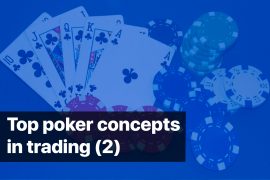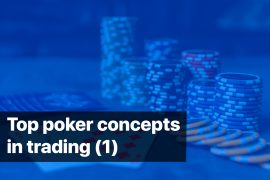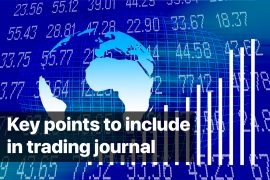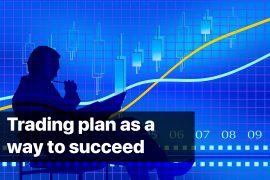Have you ever noticed that even though mankind appeared at about 150 000 — 200 000 years ago, we still have some habits which helped to survive that time? Like fight or run in case of danger, share the info, and many more. If you pay attention to your behavior during trading, you will see how these fundamental habits are ruling the process.
There are many pieces of advice like: “Minimize risks” or “Maximize profits” which are attracting attention. The reason simply is that they are closely connected to survival rules.
So, although you have an advanced smartphone with several applications and drive a fancy car, you are still unknowingly base some decisions on these habits. If you are aware of it, you are more likely to manage it well.
In other words, our brain is programmed and even a hundred thousand years are not enough for significant genetic changes to be adopted in the entire population. It is closely studied by evolutionary psychology, behavioral genetics, and anthropology, which prove that people are the result of sustained evolution. Therefore, people still tend to behave in the same way in similar cases. For instance, have you ever imagined that playing poker in terms of psychology is similar to trading? If not, read this article.
The question arises: Can we break the limits and make breakthroughs in our development, widening the gap between the generations? The question is regarded in terms of trading and investment, particularly we will look at two core psychological issues and their roots which often draw traders into a trap, preventing them from making more profits.
Puppets of emotions
In a world full of uncertainty many years ago people got accustomed to relying on their instincts. Being powerless in the face of predators or natural diseases in the Stone age, people managed to survive with the help of their sixth sense.

We feel the same while working with an unpredictable market. But here it is not a good strategy in contrast to the previous case. Definitely, our emotions are our integral part but not a trading tool! Here are a couple of reasons for this regard:
Firstly, we are what we actually think we are. And it is simply explained! In case you lose, in the majority of cases, you tend to waste your energy on negative thinking, making your logic and cunning that, as you understand, results in losses. One negative event may ruin a string of positive ones. That is why it is not recommended to label yourself as a loser and treat every failure as a catastrophe, as it works like a snowball. No need to blame yourself, just learn from the mistakes!
Secondly, one of the common mistakes of traders-newbies is anger. No doubt, in Stone age it could work as a trigger, help in fighting, revealing extraordinary power, but in trading, it is not your friend at all!
While you are angry that the market moved in the direction you expected, it does not care. It does not matter at all, even if you are maximally angry. The only thing happening is that you are more concentrated on your feelings than on analysis, keeping sidetracked and, therefore, losing opportunities.
So, it brings us to the following:
Losing? Try to focus on analysis, reveal the problem, fix it and continue earning. That is why the statistics is so important in trading, that is why there is a function of automated stats in Bitinsure. By the way, losing trades are a special issue to study, thus, dive into this article to get some tips on how to deal with losses.
Angry? Express your emotions, not in the trading terminal! Go surfing or whatever. Remember that sometimes it’s just better not to trade at all.
Keeping in control of your emotions is one of the key characteristics of a successful trader (otherwise, you may lose easily, as 95% of traders do). Of course, it is impossible to avoid emotions, but to manage them isn’t beyond your abilities. That is why it is recommended to automate your statistics and use smart risk management that keeps you from losses due to your emotions. This is what can take your trading to the next level and make you stay in-game even in the case of 100 losses in a row.
However, it is also important to understand your emotions. Let us break them down.
Running from the risk
Coming back to the Stone age, it was natural and wise to act conservatively, saving as much as possible in terms of scarce resources and sudden threads. The tough world with no controlled external forces.
Trading seems like it, which explains the similarity of the behavior of the people currently and many years ago. The normal reaction is an unwillingness to lose, trying to avoid negative consequences. And this approach does not imply taking lots of risks.
Exactly this loss aversion makes market participants react instantly on bad news. Just look at the market and news feed, which correlate so much, disclosing our fears handed down from generation to generation which drive the actions. And handed down from generation to generation. A good example is our instinctive desire to take more risks when losses start to grow, and actually, it is a common mistake typical of inexperienced traders.
However, if you are an experienced one, you know how destructive this instinct is. That is why they strictly follow already developed rules of money and risk management along with technical analysis, using the principle of cutting losses and letting profits ride, not changing stop-losses, being in rush (one more mistake).
To understand your behavior better and not being distracted by your nature, it is helpful to be aware of these three human “weaknesses”.
- We are likely to resist the changes (not paying attention to any external influence, such as media reports), unless we are extremely dissatisfied. It may also be described as a comfort zone.
- Continuing with the comfort zone, when we are happy with the current situation, we tend to stay conservative, preferring to change anything.
- The behavior of the crowd can be described by Gaussian distribution. On the left, you can find those who are acting so carefully that they are no way risking. On the right are those opposite to them, usually entrepreneurs actively looking for risky opportunities. And in the middle, the majority are trying to avoid risk in case of feeling comfortable and changing the situation if they feel any threats. Evolutionary psychology discounts all these differences and at the same time does not claim that the only adapted survive.
So, we all are different. That is why the price at which we are ready to buy an asset varies too. It is called risk tolerance. Therefore, the price influences the volume we buy. To illustrate, if you are ready to buy 1 BTC at $4000 with the price grew up to $8000 you are ready to buy half of it. Logically, having plenty of money for investments a trader feels more comfortable.
By the way, you can analyze your risk tolerance! Just draft a chart with the ratio “price-volume” and look at the dynamics.
Would you like to feel comfortable in the environment of risks? Explore and analyze! Find out your risk tolerance and apply it to your trading strategies. Use money and risk management to manage your position, try to experiment with different models of the market, even with trial accounts. This way, with the reach expertise you are much more likely to define the right strategy, limiting losses. You are not in a Stone age – use the opportunities given!
Hence, these are the only a couple of illustrations represented by evolutionary psychology. Knowing the peculiarities of the brain you can explain many actions of people. Do you remember what stands beyond market movements? Right, exactly these actions. That is the reason you see more!
What is more, specifically this knowledge underlies trading software development with analytical tools and rules for these tools. The automated risk manager may become a perfect basis for your own trading strategy, as even if you cannot fight with the forces inside you, they are quite able to identify them, explain and manage in a certain way.
Find the working ways to improve your trading performance in these articles:
- Multiply the deposit via self-awareness (1)
- Multiply the deposit with the statistics analysis (2)
- Multiply the deposit with strategy optimization (3)
Use your knowledge and your psychology to win. Use automated smart services to win more. Multiply profits and enable yourself to surf easily!
How do you manage your emotions in trading?
Join our social media to stay updated and get more articles on trading and investing:
Telegram: https://t.me/bitinsurecom
Facebook: https://www.facebook.com/bitinsure
Twitter: https://twitter.com/bitinsure_news





